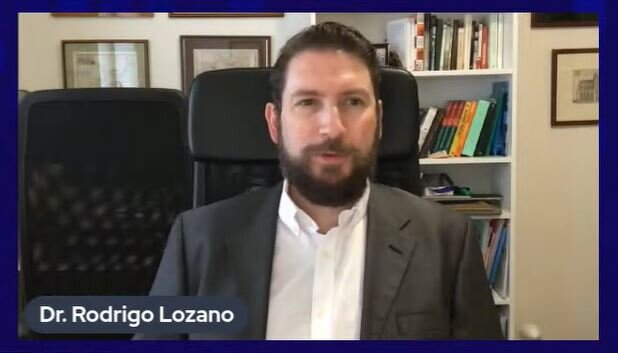“Students must understand that their decisions and actions affect the environment and society, both now and in the future.” – Rodrigo Lozano
Higher Education Institutions can promote initiatives for positive changes favoring social development and sustainability. However, it is not enough to assign a course on sustainable development in schools. What is needed is to integrate the concept of sustainable development into all courses and career disciplines. It is also essential to educate teachers to define how their classes, whatever the subject, contribute to sustainable development in the economic, environmental, social, and temporal fields. So explained Professor Rodrigo Lozano on the latest webinar of the Observatory of the Institute for the Future of Education at Tecnologico de Monterrey.
In this webinar, Professor Lozano mentions that one of the most recent developments in higher education for sustainability is the discourse centered on competencies and their connection with pedagogical approaches. Lozano et al. (2017) proposed the frame of reference aims to connect competencies with pedagogical approaches to help educators create and update their courses to provide a more comprehensive, holistic, and systemic sustainable education for future leaders, decision-makers, and educators, and change agents.
“The principles of sustainable development are opposed to many of the existing teaching concepts and methods in universities, which focus on the use (and abuse) of resources.”
In this session, Dr. Lozano explained that the interest in developing competencies for sustainable development has grown in the last six years. Nevertheless, there is little information about how to link these competencies with the pedagogies used in class. After an exhaustive analysis carried out by his research group, he defined the following 12 competencies:
-
Systemic thinking
-
Interdisciplinary work
-
Anticipatory thinking
-
Justice, responsibility, and ethics
-
Critical thinking and analysis
-
Personal relations and collaboration
-
Empathy and change of perspective
-
Communication and use of media
-
Strategy and action
-
Personal involvement
-
Evaluation
-
Tolerance of ambiguity and uncertainty
The research group also selected the most appropriate pedagogical approaches to sustainable development. According to UNESCO (2012), using various pedagogical approaches allows students to develop different learning processes that help them improve their skills and abilities to learn and think.
The research team’s analysis led to three groupings of pedagogical approaches, namely:
Universal
-
Case studies
-
Education in interdisciplinary classes
-
Traditional classes
-
Mental and conceptual mappings
-
Gamification
-
Project or problem-based learning
Community and social justice
-
Community Service Learning
-
Interconnected teams / Challenges
-
Participative action research
Environmental education
-
Eco-justice and community
-
On-site environmental education
-
Life Cycle Analysis / Supply Chain
-
Traditional ecological knowledge
Subsequently, the 12 competencies listed above were linked with these 13 pedagogical approaches to comprise part of the theoretical framework developed by Lozano et al. (2017). Using this frame of reference, various institutions worldwide carried out studies where it was possible to verify which sustainable development competencies were connected more or less to a particular pedagogical approach. To know more details of this study and the presentation of Professor Lozano, consult the entire webinar here.
Educators are fundamental to the renewal of sustainability-oriented curricula. Higher Education Institutions (HEIs) are vital change agents for social development. Although much remains to do, the progress in incorporating developmental and social welfare needs into the curricula at universities has been significant. This incorporation is recognized as a tool that provides students with the skills and knowledge to help societies become more sustainable; thus, companies can employ graduates who are literate in sustainability.
We must rethink and redesign traditional pedagogical approaches to develop the skills and competencies that enhance sustainability education. If you didn’t have the opportunity to join us live, you can view this webinar here.
Rodrigo Lozano is a full professor at Gävle University in Sweden, specializing in organizational sustainability issues. He is currently Specialty Editor-in-Chief for the journal Frontiers in Sustainability. Rodrigo holds a bachelor’s degree in Chemical Engineering (with honors) from Tecnologico de Monterrey; a Master’s degree in Environmental Management and Policy from the International Institute of Industrial Environmental Economics (IIIEE) at Lund University, Sweden; and a Ph.D. in Organizational Change Management for Corporate Sustainability at Cardiff University, Cardiff, UK.
If your native language is not Spanish, you can enable youTube’s instantaneous subtitled translation. To activate this option, select the Subtitles option on YouTube (Spanish will appear as a choice), then choose Settings ->Subtitules -> Translate automatically and then the language you prefer.
Translation by Daniel Wetta.
This article from Observatory of the Institute for the Future of Education may be shared under the terms of the license CC BY-NC-SA 4.0 
)
)


)